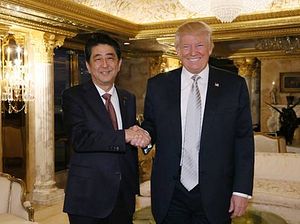When U.S. President Donald Trump hosts Japanese Prime Minister Shinzo Abe this Friday, he will find a natural ally. The Japanese government’s enthusiasm for Trump is unmistakable: Abe was the first foreign leader to visit the president-elect in November, and he will be second only to Theresa May to visit the president in an official capacity.
Both men came to power promising to make their countries “great again.” The Trump presidency offers Abe an unprecedented opportunity to realize his vision of a more powerful, internationally prominent Japan. Trump will also find a willing partner to support and legitimize his agenda. However, there are limits to Abe’s friendship and ability to deliver, particularly if Trump makes extreme demands.
During the presidential campaign, Trump promised to place America first and criticized allies for failing to shoulder their fair share of defense burdens. European allies are grudgingly adjusting to a world without traditional U.S. leadership. The attitude among the Japanese policymaking elite is somewhat different; conservatives have long felt that Japan was shackled by some aspects of the postwar order.
The Holy Grail for Japanese conservatives since the end of World War II has been revision of the constitution, particularly Article 9, which renounces war as a means of settling international disputes and limits the possession of offensive military capabilities.
Abe has favored constitutional revision for years, but a major roadblock has been the absence of popular enthusiasm – revision requires supermajorities in parliament and support in a popular referendum. The Trump presidency gives Japanese conservatives unprecedented ammunition. Not only does Trump want our allies to step up to the plate, but his “America first” policy is raising questions about the credibility of existing U.S. security guarantees. The circumstances make it perfectly reasonable for Japan to seek more robust, flexible military options.
Trump is also aiding Japanese conservatives by challenging long-established postwar norms. In a world where the U.S. president openly questions pillars of the postwar order – like free trade and NATO – a revision of Japan’s pacifist constitution no longer seems particularly remarkable. This effect extends to other issues as well; Abe has been criticized by some for heavy-handed treatment of the domestic media, but it all looks civilized compared to the daily hysterics of the White House Press Room and accusations of “fake news.”
Trump and Abe will also find common ground on their views toward China. Many Japanese policymakers see China’s rise as an existential threat, and they feel frustrated that the United States has not done more to push back. Chinese military spending now dwarfs that of Japan, and the two countries have longstanding territorial and historical disputes. The Trump administration’s public hostility toward China arguably brings U.S. policy in closer alignment with Japan’s. However, Japan will not support moves that trigger a direct military confrontation, which would be devastating for all parties involved.
What does Japan have to offer to Trump? Trump has criticized Japanese economic policy as if we were still in the 1980s, when Japan’s undervalued currency and large trade surplus triggered widespread anxiety and “Japan bashing.” We live in a different age, which means it is far easier for Japan to placate the president. Japanese foreign direct investment in the United States is already massive – more than $344 billion, second only to the United Kingdom.
Moreover, Japanese corporations can easily repackage investments that they would have made anyway, handing high-profile public victories to the president. A good example is Masayoshi Son’s December pledge at Trump Tower that Softbank would invest $50 billion in the United States to create 50,000 jobs. Japan will be willing to offer much more of this in the coming years.
It will be difficult for Abe to make concessions on the yen – the currency is affected by the so-called “first arrow” of Abenomics, which seeks to escape long-standing deflation through aggressive monetary policy. Accepting a stronger yen will make it difficult for Japan’s economy to achieve sustained growth. On the other hand, Abe may be willing to offer some concessions on trade to maintain friendly relations.
Support for protectionism in Japan is not what it used to be. Japanese farmers, who were once a dominant force against free trade, have increasingly aged or retired. Abe has shown a willingness to support trade liberalization over domestic opposition as a way to accelerate economic reforms. Though the Trans-Pacific Partnership (TPP) now appears dead, there may be room to pursue a bilateral trade agreement that benefits both sides.
The main question is what Trump will be willing to offer to get Abe on board.
Phillip Y. Lipscy is assistant professor of political science and Thomas Rohlen Center fellow at the Shorenstein Asia-Pacific Research Center, Stanford University

































